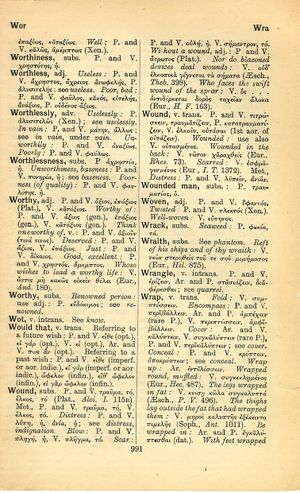wound: Difference between revisions
Oἷς ὁ βιος ἀεὶ φόβων καὶ ὑποψίας ἐστὶ πλήρης, τούτοις οὔτε πλοῦτος οὔτε δόξα τέρψιν παρέχει. → To those for whom life is always full of fears and suspicion, neither wealth nor fame offers pleasure.
(CSV5) |
m (Text replacement - "<b class="b2">H. F.</b>" to "''H. F.''") |
||
| Line 16: | Line 16: | ||
<b class="b2">Nor do blazoned devices deal wounds</b>: V. οὐδʼ ἑλκοποιὰ γίγνεται τὰ σήματα (Aesch., <b class="b2">Theb.</b> 398). | <b class="b2">Nor do blazoned devices deal wounds</b>: V. οὐδʼ ἑλκοποιὰ γίγνεται τὰ σήματα (Aesch., <b class="b2">Theb.</b> 398). | ||
<b class="b2">Who faces the swift wound of the spear</b>: V. ὃς... ἀντιδέρκεται δορὸς ταχεῖαν ἄλοκα (Eur., | <b class="b2">Who faces the swift wound of the spear</b>: V. ὃς... ἀντιδέρκεται δορὸς ταχεῖαν ἄλοκα (Eur., ''H. F.'' 163). | ||
'''v. trans.''' | '''v. trans.''' | ||
Revision as of 16:24, 22 July 2017
English > Greek (Woodhouse)
subs.
P. and V. τραῦμα, τό, ἕλκος, τό (Plat., Alci. I. 115B).
Met. P. and V. τραῦμα, τό, V. ἕλκος, τό.
Distress: P. and V. λύπη, ἡ, ἀνία, ἡ; see distress, indignation.
Blow: P. and V. πληγή, ἡ, V. πλῆγμα, τό.
Scar: P. and V. οὐλή, ἡ. V. σήμαντρον, τό.
Without a wound, adj.: P. and V. ἄτρωτος (Plat.).
Nor do blazoned devices deal wounds: V. οὐδʼ ἑλκοποιὰ γίγνεται τὰ σήματα (Aesch., Theb. 398).
Who faces the swift wound of the spear: V. ὃς... ἀντιδέρκεται δορὸς ταχεῖαν ἄλοκα (Eur., H. F. 163).
v. trans.
P. and V. τιτρώσκειν, τραυματίζειν, P. κατατραυματίζειν, V. ἑλκοῦν, οὐτάσαι (1st aor. of οὐτάζειν).
Wounded: use also V. οὐτασμένος.
Wounded in the back: V. νῶτον χαραχθείς (Eur. Rhes. 73).
Scarred: V. ἐσφραγισμένος (Eur., I. T. 1372).
Met. Distress: P. and V. λυπεῖν, ἀνιᾶν.

